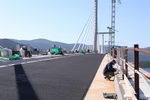
The European Energy Community launched proceedings against Bosnia and Herzegovina over violations of the community's regulations when giving clearance to two thermal power plants in Tuzla and Kakanj without the necessary upgrade of their environment pollution prevention systems.
Oglas
The Community's press release, issued on Saturday, reads that the continuation of the work of those two plants was in contravention of Directive 2001/80/EC of the European Parliament and of the Council on the limitation of emissions of certain pollutants into the air from large combustion plants.
It is also against Bosnia and Herzegovina's national plan for the reduction of emissions of certain pollutants.
The European Energy Community's Secretariat warns that the continuation of the operation in the Tuzla and Kakanj plants would produce a negative impact on the health of the citizens of Bosnia and Herzegovina.
Bosnia and Herzegovina's authorities failed to deliver on their promise that the Tuzla thermal power plant's block no. 4 and the Kakanj thermal power plant's block no. 5 would cease operating after they spent 20,000 hours of operation since 1 January 2018. They insisted that the gradual phase-out of the use of those plants was necessary for the sake of local mines and workers.
Those coal-fuelled power plants could remain in business provided that they meet the stricter conditions as stipulated in the EU directive, according to the European Energy Community's decision.
The Energy Community brings together Albania, Bosnia and Herzegovina, Kosovo, Macedonia, Moldova, Montenegro, Serbia and Ukraine – and soon also Georgia – with the goal of creating a common energy market between the EU and some of its neighbours. It also aims to extend the EU internal energy policy to southeast Europe and the Black Sea region.
This includes the obligation for member states to implement EU environmental law and renewable energy targets.
In 2020 alone, coal-fired power plants in Bosnia and Herzegovina, Serbia, North Macedonia, Montenegro and Kosovo emitted two and a half times as much sulphur dioxide (SO2) as all other such power plants in the EU.
In 2017, the World Health Organization said that in Bosnia and Herzegovina 231 persons per 100,000 inhabitants died of polluted air.
Kakvo je tvoje mišljenje o ovome?
Učestvuj u diskusiji ili pročitaj komentare
Oglas
Kakvo je tvoje mišljenje o ovome?
Učestvuj u diskusiji ili pročitaj komentare
Oglas





 Srbija
Srbija
 Hrvatska
Hrvatska
 Slovenija
Slovenija



























































